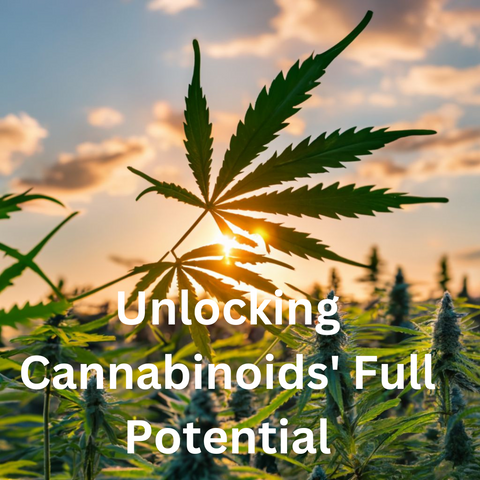Embarking on a journey through the lush fields of hemp-derived cannabinoids can be both enlightening and bewildering. Are you someone who's been curious about the distinct characteristics of THC (tetrahydrocannabinol) and THCA (tetrahydrocannabinolic acid)? If so, you're in for a treat! In this guide, we'll explain the differences between these two compounds in a simple and clear way.
THCA vs THC: Laying the Foundation
Precursor to THC - The Starting Point
Our journey begins with the basics - THCA, the precursor to THC. This naturally occurring compound in raw cannabis plays a pivotal role in the transformation process. But what exactly is this precursor, and how does it evolve into the famed THC? Let's demystify the process of decarboxylation and explore its significance in the world of cannabinoids.
Understanding the precursor to THC, THCA, is like discovering the blueprint of a masterpiece. Just as an artist sketches the initial lines before creating a masterpiece, THCA is the groundwork for the potent effects associated with THC. In its raw form, THCA is non-intoxicating, waiting for the right moment to transform into its more well-known sibling, THC.
Decarboxylation, a process triggered by heat, sunlight, or even aging, is the key to this transformation. It's akin to turning raw ingredients into a delectable dish - activating the cannabinoids to unlock their full potential. This process is a crucial step, whether you're using cannabis for therapeutic or recreational purposes.

The Dynamic World of THC - Effects and Benefits
Intoxicating Effects: What to Expect
THC, renowned for its psychoactive effects, has left many intrigued by the intoxicating sensations associated with cannabis products. From a beginner's standpoint, understanding these effects is crucial. What exactly happens in your body, and what can you expect from the intoxicating journey? Let's unravel the mystery behind the psychoactive effects of THC.
As THC interacts with the endocannabinoid system, a complex network of receptors in our bodies, it triggers a cascade of responses that lead to the well-known high. The intoxicating effects of THC can vary from person to person, influenced by factors such as dosage, individual tolerance, and consumption method.
While the euphoric high is what draws many to THC, it's essential to recognize its potential benefits beyond recreation. THC has demonstrated its efficacy in reducing nausea and vomiting, making it a valuable tool for individuals undergoing chemotherapy or struggling with appetite issues.
Benefits of THC - Beyond the High
Beyond the high, THC unveils a range of potential benefits. How does THC contribute to reducing nausea and vomiting? What about its neuroprotective properties? Let's delve into the scientific intricacies of THC's interaction with our endocannabinoid system and explore the multifaceted benefits that have captured the attention of researchers and consumers alike.
Research suggests that THC may act as a neuroprotectant, potentially guarding against certain neurological disorders. The interaction with the endocannabinoid system modulates neurotransmitter release, exhibiting neuroprotective effects that could have implications for conditions like Alzheimer's and multiple sclerosis.
THCA - Raw Cannabis's Hidden Gem
Decarboxylation Processes - Unveiling the Transformation
Dive deep into the decarboxylation processes, understanding how THCA undergoes a transformation into THC. This chemical metamorphosis is a crucial step that unlocks the full potential of cannabinoids, offering a new perspective on the synergy between raw cannabis and its activated form. How does this process impact the potency of cannabis products, and what role does it play in the varied effects experienced by users?

Understanding the decarboxylation process sheds light on the intricacies of cannabis consumption. Whether you're using cannabis for its therapeutic effects or seeking a recreational experience, the activation of cannabinoids through decarboxylation is the key to unlocking their full potential.
Benefits of THCA - Exploring the Raw Form
In its raw form, THCA presents a unique array of benefits. Explore the world of carboxylic acids, understanding how these compounds contribute to the therapeutic potential of raw cannabis. From potential anti-inflammatory properties to unexpected benefits, let's uncover the nuances that might redefine your perception of this cannabinoid.
THCA, in its raw form, is a treasure trove of potential health benefits. Some users prefer consuming raw cannabis or products specifically designed to preserve THCA to harness these potential advantages. Research suggests that THCA may possess anti-inflammatory properties, making it an intriguing option for those seeking natural remedies for conditions like arthritis or autoimmune disorders.
THCA Edibles: A Subtle High with Preserved Benefits
Contrary to common belief, THCA edibles can indeed induce a mild high. This is because the THCA has undergone decarboxylation during the edible creation process, transforming it into THC. Despite this transformation, these edibles maintain the therapeutic benefits associated with raw cannabis, providing users with a unique blend of gentle euphoria and potential health advantages. Let's delve into the nuanced experience that THCA edibles offer.
Subtle High, Preserved Benefits
THCA edibles bring forth a distinctive combination of effects, offering users a subtle high while retaining the potential therapeutic benefits of raw cannabis. The decarboxylation process that occurs during edible preparation activates the THCA, transforming it into THC. This results in a milder intoxicating experience compared to traditional THC edibles, making them an appealing option for those seeking a balanced and controlled effect.
Navigating the Decarboxylation Process
Understanding the decarboxylation process is crucial when delving into THCA edibles. Unlike raw cannabis, where THCA is in its non-intoxicating form, these edibles undergo a transformation that activates the THC. Users can now experience the desired THC high, but in a milder way, due to this change in composition.
Balancing Intoxication and Therapeutic Effects
While THCA edibles do provide a mild high due to decarboxylation, users can still benefit from the potential therapeutic effects associated with cannabinoids. From anti-inflammatory properties to potential neuroprotective benefits, these edibles offer a delicate balance, catering to individuals seeking both recreational and wellness experiences.
THCA Edibles - A Blend of Euphoria and Wellness
THCA edibles offer a unique amalgamation of mild intoxication and preserved therapeutic benefits. The decarboxylation process introduces a subtle high, making them an attractive option for users seeking a controlled and nuanced experience. THCA edibles are a versatile choice for cannabis users. They offer a mix of euphoria and potential health benefits. This is especially important as the way people consume cannabis changes.
FAQs: Navigating the Cannabinoid Landscape
*Q1: Is THC legal?
While THC is legal in certain regions, it's important to be aware of local regulations. Consult your local authorities to understand the legality of THC in your area.
*Q2: Can THCA get you high?
In its raw form, THCA is non-intoxicating. Only after decarboxylation does it convert to THC and acquire psychoactive properties.
*Q3: What's the best way to consume THCA?
Consuming raw cannabis or opting for products specifically designed to preserve THCA can be the most effective way to experience its potential benefits.
*Q4: Are there differences in effects between THC and THCA?
Yes, there are notable differences in the effects. THC is psychoactive, inducing a high, while THCA, in its raw form, lacks intoxicating effects.
Professional Testimonies: Voices from the Industry
Dr. Emily Green, Cannabis Researcher:
"As a researcher in the field of cannabis, the interplay between THC and THCA is a fascinating subject. The versatility of these compounds opens doors to a myriad of potential therapeutic applications, and ongoing studies continue to unveil their benefits."
John Thompson, Cannabis Product Developer:
"In the product development landscape, understanding the difference between THC and THCA is crucial. It allows us to craft formulations that cater to diverse consumer needs, from those seeking therapeutic effects to those embracing the recreational aspects of cannabis."

Conclusion:
To traverse the landscape of THC and THCA is to embrace a profound understanding of hemp-derived cannabinoids. From the precursor to THC and the effects of THC to the benefits of THCA in its raw form, we've covered the spectrum. Whether you're a novice or a seasoned enthusiast, this comprehensive guide aims to make the science behind cannabinoids accessible, ensuring you navigate the world of hemp-derived compounds with confidence.
Knowledge is the key to empowerment, and as the cannabis landscape evolves, staying informed becomes paramount. Dive into the potential benefits, appreciate the science, and relish the journey into the intricate world of cannabinoids.
